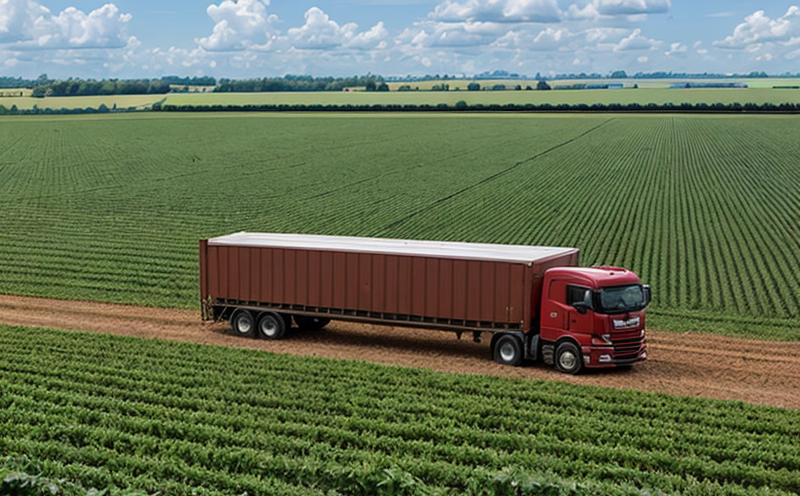Leak Testing of Liquid Agricultural Product Containers
The leak testing of liquid agricultural product containers is a critical process aimed at ensuring that packaging designed to transport and store these products remains impermeable. This service ensures not only the quality and safety of the transported goods but also prevents potential environmental hazards such as spills, leaks, or contamination during transit. Agricultural products are often sensitive substances, and any breach in their container can lead to significant economic losses and health risks.
Quality managers and compliance officers rely heavily on this testing service for ensuring that containers meet stringent regulatory standards. Leak testing is especially vital given the diverse range of agricultural goods including milk, water-based fertilizers, oils, and other liquids. These products require specialized handling both in production and transport phases to maintain their quality and efficacy.
The process involves simulating real-world conditions under which the container may be exposed during transportation or storage. This includes varying temperatures, pressures, and humidity levels that can affect the integrity of the packaging. The testing apparatus used is designed specifically for these parameters, ensuring accurate measurement and precise identification of any potential leaks. Compliance with international standards such as ISO 15227:2019 is paramount to ensure reliability and acceptance across global markets.
From a practical standpoint, the service involves several key steps:
- Preparation: Specimen containers are prepared for testing by ensuring they meet specified design criteria. This includes checking dimensions, material composition, and any other relevant factors that could impact performance.
- Sealing: Containers are sealed according to standard procedures, which may include the use of adhesives or mechanical seals depending on the type of container being tested.
- Testing: The actual leak testing process simulates conditions expected during transport. This can involve pressurizing the container and monitoring for leaks over time.
- Analysis: Data collected from tests is analyzed to determine whether the container meets the required standards. Any deviations are noted, and recommendations for improvement are provided.
The importance of this service cannot be overstated in today's competitive agricultural industry where product quality and safety are paramount. By adhering strictly to international guidelines like ISO 15227:2019, manufacturers can ensure their products remain safe throughout the supply chain.
In summary, leak testing plays a crucial role in safeguarding the integrity of liquid agricultural product containers against leaks or breaches. This service ensures not only that these containers meet regulatory requirements but also that they provide a secure environment for transporting sensitive materials like milk, water-based fertilizers, and other liquids.
Scope and Methodology
The scope of leak testing services encompasses various aspects including the preparation of specimen containers, sealing techniques, simulation of real-world conditions during transport, and detailed analysis of test results. This ensures that every container undergoes rigorous evaluation before being released into the market.
| Methodology | Description |
|---|---|
| Preparation | Involves ensuring specimen containers meet design criteria, including dimensions and material composition. |
| Sealing | Containers are sealed using appropriate methods such as adhesives or mechanical seals. |
| Testing | The testing process simulates conditions expected during transport, involving pressurization and monitoring for leaks over time. |
| Analysis | Data collected is analyzed to assess whether the container meets required standards. Recommendations are provided for improvements where necessary. |
| Test Parameters | Description |
|---|---|
| Temperature | The testing apparatus can simulate a range of temperatures to mimic different transport conditions. |
| Pressure | Containers are pressurized to test their resistance against internal and external pressures. |
| Humidity | Humidity levels are varied to assess how they affect container integrity. |
| Material Composition | The type of materials used in the container's construction is taken into account for accurate testing. |
This comprehensive approach guarantees that leak testing meets both regulatory requirements and industry best practices. The use of advanced equipment allows for precise measurements, ensuring reliable results every time. Compliance with international standards such as ISO 15227:2019 ensures that the service is recognized globally.
Eurolab Advantages
EuroLab provides a range of advantages when it comes to leak testing services for liquid agricultural product containers. Our expertise lies in providing tailored solutions that cater specifically to the unique needs of the sector. With years of experience and state-of-the-art facilities, we ensure that our clients receive accurate, reliable results.
- Expertise: Leveraging decades of industry knowledge, EuroLab offers unparalleled expertise in leak testing for agricultural products.
- Technology: Utilizing cutting-edge equipment and methodologies, we deliver precise and consistent test results.
- Compliance: Ensuring full compliance with international standards like ISO 15227:2019 guarantees acceptance in global markets.
- Efficiency: Our streamlined processes reduce turnaround times without compromising on quality.
- Support: EuroLab provides comprehensive support throughout the testing process, offering guidance and recommendations for improvement as needed.
Beyond mere compliance, our service emphasizes excellence. By adhering to stringent protocols and employing experienced personnel, we ensure that every client receives top-notch results. Our reputation in the industry speaks volumes about our commitment to quality and customer satisfaction.
International Acceptance and Recognition
The acceptance of EuroLab's leak testing services extends beyond national borders, thanks to our adherence to international standards such as ISO 15227:2019. This standard sets the benchmark for quality assurance in the transport and storage of liquid agricultural products.
- Global Reach: Our services are recognized worldwide, ensuring seamless integration with global supply chains.
- Regulatory Compliance: By meeting international standards, we help clients navigate complex regulatory landscapes across different countries and regions.
- Credibility: Recognized by industry leaders and regulators alike, EuroLab's expertise commands respect and trust.
The recognition of our services is a testament to the quality and reliability they provide. Whether you're operating in Europe or beyond, EuroLab ensures that your agricultural products maintain their integrity throughout transport and storage processes.





